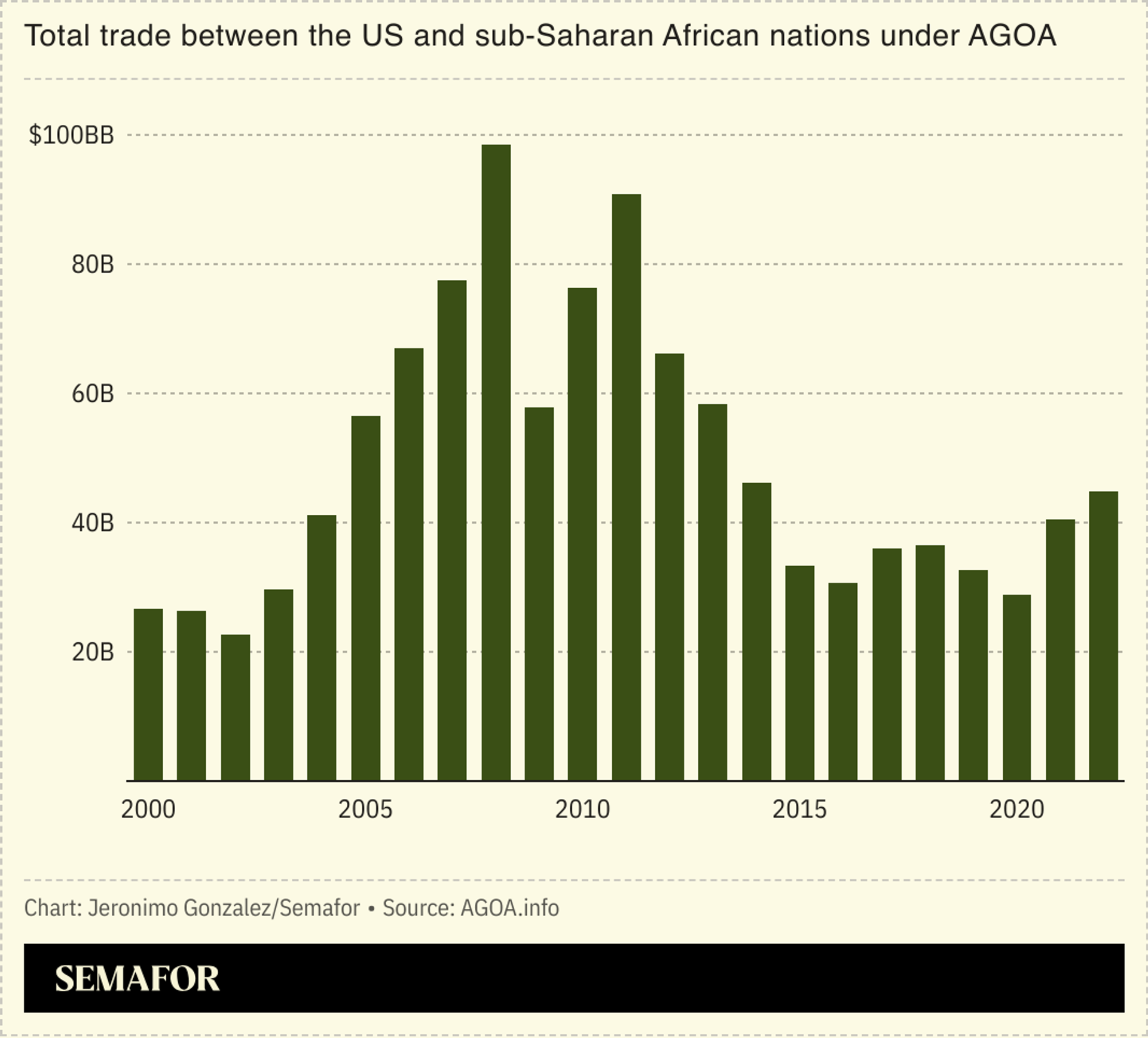The News
Africa policy watchers in Washington, DC, are increasingly skeptical about the future of the African Growth Opportunity Act (AGOA), a trade deal that offers sub-Saharan African countries duty-free access to the US market.
The 25-year-old free-trade program, set to expire in September, is unlikely to survive in its current form, Capitol Hill staffers and analysts told Semafor, as US President Donald Trump pursues a policy of introducing tariffs with longstanding free trade partner nations.
One congressional staffer, who spoke to Semafor on condition of anonymity, said they viewed AGOA as “80% dead.” News that four Republican Congressmen this month called for South Africa to be ruled ineligible for AGOA over geopolitical concerns has only added to the uncertainty.
Zainab Usman, director of the Africa program at the Carnegie Endowment for International Peace, said she was “not encouraged” by the tone of discussions she has heard publicly and privately about AGOA’s future in Washington. But she added there was still plenty of opportunity to reposition the program for the current environment in a way that shows it helps the US as much as it helps African countries. “It should be reframed within the transactional mindset of this administration and this geopolitical era,” she said.
Know More
In 2023, US imports under AGOA topped $9.7 billion, down from $10.2 billion the previous year. The arrangement, which allows eligible African countries and businesses to export goods to the US under favorable tariff-free terms, was dominated that year by $4.2 billion in crude oil trade. It also included around $1.1 billion in apparel and over $900 million in agricultural products.
The US Congress is responsible for approving the next iteration of the act, which has typically commanded bipartisan support. But there is uncertainty about its future this time around, not least because of the tone of the debates around free trade in Washington. Trump’s “America First Trade Policy” executive order on Jan. 20 has called on the US Trade Representative, the Treasury department, and the Commerce department to review all United States trade deals. Some analysts are awaiting the outcome of that review on April 1 to determine AGOA’s future.

“The idea of a preferential trade deal is a difficult one in the current environment. And given the executive order, it leaves a question mark on AGOA’s future,” said Frannie Léautier, who authored an Atlantic Council report in 2023 calling for AGOA’s early renewal. It could boil down to making a practical case in AGOA’s favor, showing that tariffs are more costly than preferential trade for US companies. “That might help,” said Léautier.
Yinka’s view
The uncertainty around AGOA is surprising because while there are differences of opinion around technical details, the trade act has always received bipartisan support in Congress and from White House administrations of either stripe.
Even Heritage Foundation’s Project 2025, which is broadly believed to be a rough blueprint for Trump’s policy approach, offered fairly standard language about AGOA ahead of last November’s election.
But AGOA seems to have been caught up in the shock and awe furor around the dismantling of USAID and no one is certain anymore what might happen. “I don’t know” was the most common response I got in recent days when I spoke to Africa analysts and Congress aides. A few months earlier it was “when” not “if.”
To be clear, while AGOA has had some wins, it has not been the kind of rip-roaring success that has driven African imports to grow exponentially every year. The $9.7 billion AGOA imports to the US last year was a miserly share of the $3.9 trillion of global US imports.
And yet, even in this Trump 2.0-era of Washington upheaval, there is an optimistic take that’s beginning to crystallize. This is that forcing AGOA to be seen as a transactional opportunity for the US as much as for Africa will help break the program away from its development partnership roots. If successful, the optimistic view is it could finally start to be transformative for more African countries.
The View From SOUTH AFRICA
South Africa has been in the eye of the storm with regards to US relations in recent weeks in a range of sensitive geopolitical and domestic policy issues. AGOA came into focus as one of the levers that might be used against South Africa when four US congressmen called for its eligibility to be revoked.
This is particularly significant because South Africa, the continent’s most industrialized economy, is the largest beneficiary of the free trade program through which it exports cars, citrus fruits, wine, and textiles worth nearly $2 billion annually to the US.
Neil Diamond, president of the South African Chamber of Commerce in the US, told Semafor: “The biggest immediate concern is uncertainty, which discourages investment, disrupts supply chains, and forces businesses to consider alternative markets.”
Room for Disagreement
Far from giving up on AGOA, it is expected that US Democratic Senator Chris Coons and his Republican counterpart Senator James Risch, who chairs the Senate’s foreign relations committee, will look to introduce updated legislation on the act, according to two people familiar with the plans. Last year Coons and Risch introduced the AGOA Renewal and Improvement Act in a bid to jumpstart the delayed renewal process.
Notable
- Why Agoa expiry should give Africa sleepless nights more than Donald Trump’s tariff wars.
- Agoa’s uncertain future: How Trump’s America First policy will impact Africa.
